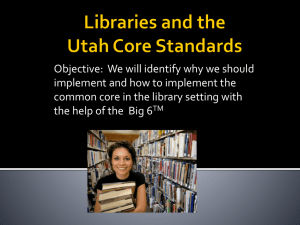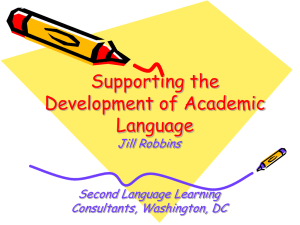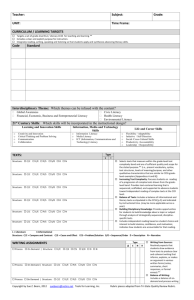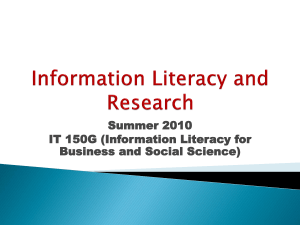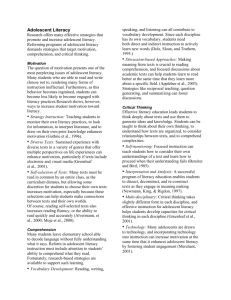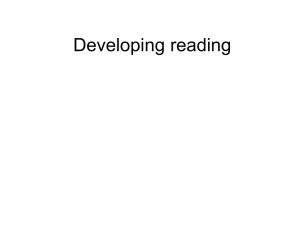literacy
advertisement
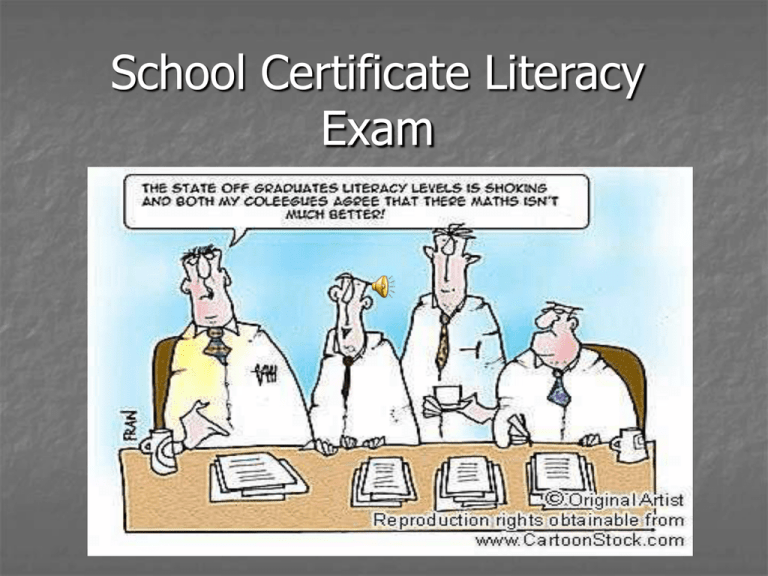
School Certificate Literacy Exam Add cartoon What is Literacy? lit·er·a·cy –noun 1.the quality or state of being literate, esp. the ability to read and write. 2.a person's knowledge of a particular subject or field: to acquire computer literacy Literacy in Mathematics What is the volume of this triangular prism? The diagram shows the metal frame of a roof. The triangle ABC is isosceles with AB = CB. The midpoints of AB and CB are Y and Z respectively. Show, by calculation, that the length of AB is 3.4 metres, correct to one decimal place Literacy in Science The word equation for photosynthesis is: carbon dioxide + water −−−> glucose + oxygen + water What are the reactants for photosynthesis? (A) Oxygen and glucose (B) Carbon dioxide and water (C) Light, oxygen and glucose (D) Light, carbon dioxide and water Literacy in History and Geography Geographical Issues air quality, land and water management, coastal management, spatial inequality waste management, urban growth and decline Choose ONE issue from the box above. Issue chosen .............................. Outline the main geographical processes relevant to the issue you have chosen. Literacy in English How does the language change from the second last paragraph (lines 45–47) to the last paragraph (lines 48–54)? (A) From first person to second person (B) From second person to third person (C) From second person to first person (D) From third person to first person Provide ONE quotation from the opening paragraph that indicates that 1 Patterson is ending her studies. Imagine that a radio program host is interviewing a guest about his or her participation in an activity in the local community. Literacy in Course Work Unit 1 Term 1 Title: Pump up the Volume Weeks 1-6 Rubric: Through the close study of lyrical poetry, students will explore a variety of poetic techniques and be able to discuss their function and intended purpose in the text. Students will also evaluate the role of lyrical poetry in society as a medium for youth to express: views, opinions and themselves. Unit 2 Title: A Taste of Genre Term 1 Weeks 8-11 Rubric: Students will examine a number of film trailers on a variety of genres. Students will study the language used in these trailers to establish the conventions of the genre. Through changing the language, students will appropriate the genre of the film. Students will use these texts as the basis for composing in a variety of text types. Unit 3 Title: Risks and Challenges Term 2 Weeks 1-10 Rubric: Through the exploration of an Area of Study topic, students examine the techniques used in texts convey meaning. Students also explore and understand the connections between their novel as the set text and a combination of non fiction and multimedia texts through intertextuality. Students will use these texts as the basis for composing and responding to a variety of text types. Unit 4 Title: Young Writers Term 3 Weeks 1-10 Rubric: Students revise and extend their writing skills. Students will compose a writing portfolio using a variety of devices, features, techniques and stylistic forms on topics of interest What is in the Literacy Exam? Reading time: 10 minutes Working time: 2 hours Section 1 — Reading/Viewing Total marks – 90 - Reading 60 marks/ Viewing 30marks Allow about 1 hour and 20 minutes for this section Section 2 — Writing - 30 marks Allow about 40 minutes for this section This section has TWO questions Reading Section You will be presented with a variety of text forms that require multiple choice responses (refer to Green Sheets and past papers) Multiple choice questions will be: Language based questions Opinion or inferential questions based on understanding Content based questions LOC formula to identify what the question is asking Viewing Section You will be presented with a visual text – DVD cover, CD cover, Poster, Brochure, Advertisement, Webpage etc that you will need to respond to Short answer responses deconstructing the visual techniques used to convey meaning. Writing Section This is where you become the composer and a chance to ‘show off’ your literacy skills Two pieces of writing Based on the theme of the paper Two different text forms – PILS formula What techniques are appropriate for this text form? You MUST engage the reader. Do not write predictable, pedestrian, teenage angst responses How to Prepare for the Exam Reading Section – Hot Tips Read!!! Know the definitions of techniques. (again refer to green sheet) Be able to identify techniques. Know what the technique is used for– the composer’s intent Know the Purpose, Intended audience, Language and Structure of a wide variety of texts (PILS Formula) Reading in context – if you do not know the meaning of a word – try to work it out by reading the sentences before and after. Educated guesses – use what you know to eliminate the incorrect answers – usually end up with 50% guess. How to Prepare for the Exam Viewing Section - Hot tips Know the definitions of visual techniques. (again refer to green sheet) Be able to identify techniques. Know what the technique is used for– the composer’s intent Know the Purpose, Intended audience, Language and Structure of a wide variety of texts (PILS Formula) How to Prepare for the Exam Writing Hot tips Know the definitions of visual techniques. (again refer to green sheet) Be able to identify techniques. Know what the technique is used for– the composer’s intent Know the Purpose, Intended audience, Language and Structure of a wide variety of texts (PILS Formula) Draw on the theme of paper for inspiration. Look at the texts you have read and viewed to help you with ideas. Past School Certificate Results 2007 2006 6 4 (2.36) 4,889 (5.95) 6 1 (0.64) 4,589 (5.53) 5 39 (23.07) 22,684 (27.64) 5 16 (10.38) 21,098 (25.45) 4 78 (46.15) 31,663 (38.58) 4 74 (48.05) 33,448 (40.35) 3 35 (20.71) 16,480 (20.08) 3 41 (26.62) 14,233 (17.17) 2 10 (5.91) 4,034 (4.91) 2 19 (12.33) 5,868 (7.07) 1 2 (1.18) 1,092 (1.33) 1 3 (1.94) 2,414 (2.91) None 1 None 0 (0) 1,241 (1.49) (0.59) 1,217 (1.48) QuickTime™ and a YUV420 codec decompressor are needed to see this picture. Website Board of Studies
